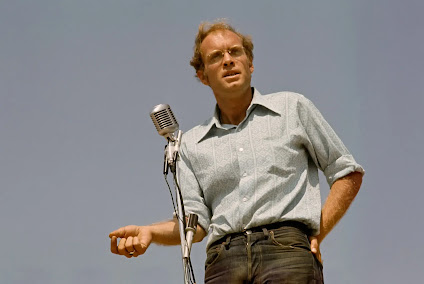Faulkner said it: “The past is never dead. It's not even past.”
I was reminded of this observation on the day I read David Harris' obituary, published in The New York Times on February 8, 2023. For those who don't know anything about David Harris, it might be that The New York Times' paywall will be on vacation when you click that link to read David's obituary. Maybe it's a wan hope, but I'd say, give it a try, anyway! If that doesn't work, this link will take you to a Wikipedia entry that will tell you quite a bit about David Harris.
I knew David at Stanford (he was in a graduating class a couple of years behind me). Like David, I was a draft resister, and was a member of "The Resistance," the antiwar group that David founded, to encourage young men to refuse induction into the armed forces. I was sorry to learn, on Wednesday, February 8th, of David's death on February 6, 2023. As I say, if you don't know anything about David, I encourage you track down his obituary and/or other information available on the internet. Among other things, David was married for a time to Joan Baez, who met David (according to Wikipedia) in the Santa Rita Jail, after both she and David (and Joan Baez' mother) were arrested for participating in a draft protest at the Oakland Induction Center. I wasn't there, that time, in 1967, but the Oakland Induction Center is where I was also arrested, when I refused induction in 1968.
Besides the fact that I wanted to acknowledge and celebrate the life of David Harris, this blog posting is prompted by another article in the February 8, 2023, edition of The Times. Choe Sang-Hun, a Pulitizer-prize winning South Korean journalist, wrote an article that appeared that day on page A4 of the hard copy edition of the paper. That article reported on a court decision handed down in South Korea on Tuesday, February 7, 2023. I am sorry not only that David died, but that he didn't live to hear this news.
On that Tuesday, February 7th, the day after David died, a South Korean court ruled that South Korean marines were guilty of committing a massacre of unarmed villagers during the Vietnam War, and that the South Korean government would have to compensate Nguyen Thi Thanh, whose relatives were killed during the massacre. The Times' paywall permitting, this news story, too, is very much worth reading. Among other things, the decision of the South Korean court indicates that mere time will not be permitted to erase the truth, and that "the past" is truly, as Faulkner says, "not even past." The past is "fact." Whatever possibility there may be for something new to exist will be found in the future - and, of course, we are right in the middle, between past and future, which is not a "comfortable" spot.
It sometimes seems to me that the United States has spent most of my lifetime trying to forget - or actually deny - what the United States did in Vietnam. If the South Korean marines were guilty of war crimes in Vietnam, then certainly American soldiers and political leaders were, too.
As I salute David Harris in this blog posting, may I hope that the citizens of the United States will use whatever time still remains to them to acknowledge the horrors that our country wrought in Vietnam - and in Iraq, and in Afghanistan, and elsewhere. Until a nuclear war makes this impossible (and the Concerned Scientists think there is little time left), there is still an opportunity for each one of us to do what David Harris did, and to stand up against war - including our past, present, and future wars - even if that requires putting at risk our own personal freedom.
David, no longer here with us, is still a model of what we need to do.
Image Credit:
https://www.nytimes.com/2023/02/07/us/david-harris-dead.html

No comments:
Post a Comment
Thanks for your comment!